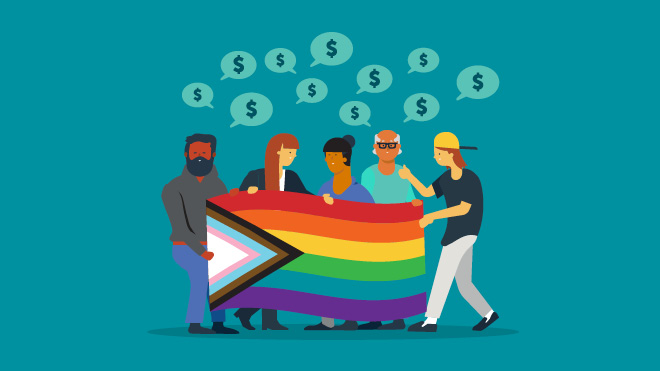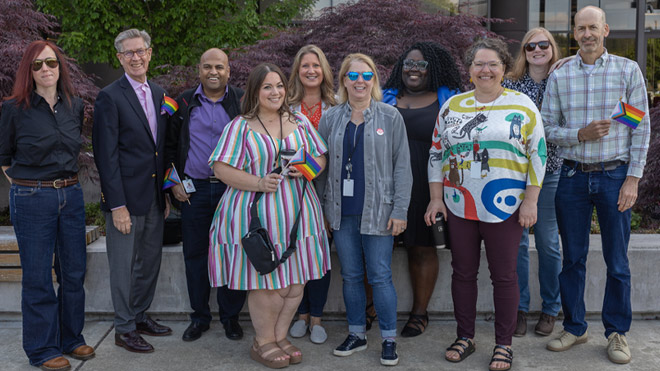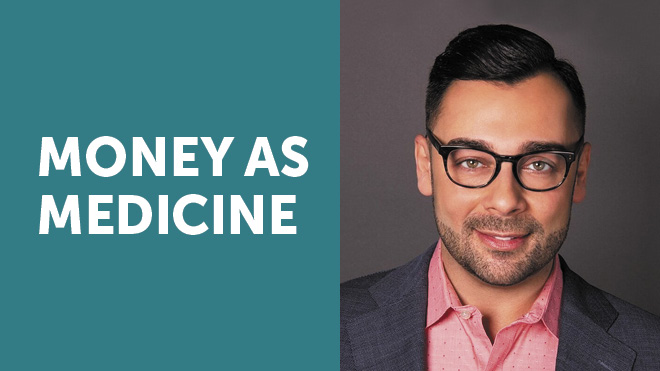
Why You Should Spend With Pride Year-Round
Pride Month is about more than parades, parties and rainbow flags. We talked with GSBA, the Seattle-based LGBTQ+ chamber of commerce about being intentional with your dollars to support the LGBTQ+ community.
Pride Month is a time to get together to loudly and visibly celebrate LGBTQ+ people, culture and communities. That's the fun part. But what if you want to make a year-round commitment?
We turned to our partners at the GSBA, Washington state's LGBTQ+ chamber of commerce, to talk about the importance of voting with your wallet to support the LGBTQ+ community — and show other businesses that it pays to embrace diversity, equity and inclusion.
Values-Based Spending
Amy Burdick, GSBA's director of Partnership Development said momentum for Pride celebrations has definitely picked up over the years, but it's a constant challenge to get the excitement to continue beyond June.
"We've come a long way from Pride as just a Sunday parade," Burdick said. "But we're hoping to create a Pride 365 scenario, where people support Pride year-round."
Ahi Martin-McSweeney, who manages the GSBA's Capitol Hill Business Alliance Program, said people seem to be getting savvier and more empowered to spend in a way that aligns with their values. GSBA tries to make it easier for people to make those spending choices.
"Consumers are getting more educated, but they don't want to spend a thousand minutes scrolling and clicking down a rabbit hole," Martin-McSweeney said. "If they can't find what they need quickly, they often default to a larger retailer and bypass the small, local option."
Martin-McSweeney said the key is to provide a go-to resource that connects people with those everyday purchases at LGBTQ+ businesses.
An uptick in interest in GSBA membership is in line with a growing trend of values-based consumerism. That makes it especially important for brands to show their customers where they stand.
Why Intentional Spending Matters
Despite gains in LGBTQ+ rights over the years, anti-LGBTQ+ discrimination has recently been on the rise, and legislation in many states across the country has been focused on dismantling those gains.
At the time of this writing, the ACLU has tracked 491 anti-LGBTQ bills in the U.S., and the Human Rights Campaign Foundation was estimating 30.9% of transgender youth live in states that have passed bans on gender-affirming care.
Gabriel Neuman, GSBA's Policy Counsel and Government Relations Manager, said Washington, which has one of the strongest anti-discrimination laws in the nation, can serve as a model for other states that are attempting to create legislative protections for LGBTQ+ communities.
"I'm proud Washington can serve as that model, but there are still battles that need to be fought in other states," Neuman said. "We're seeing a lot of folks who feel privileged to live in a state like Washington, but who also feel powerless to do something to support people in states like Florida. Spending their money at LGBTQ+ businesses helps people feel like they can support the community in the wake of these issues."
Martin-McSweeney said that in addition to advocating for spending "like it matters," GSBA is working in the community to develop an LGBTQ+ economy: "It's not that we're just legally allowed to be here, but we want to create an environment where entrepreneurs and businesses can thrive here."
The COVID-19 pandemic added to the burden for many LGBTQ+ people who were already struggling to achieve economic stability. Rather than increasing opportunities to recover, political efforts in many states have further increased the challenges for LGBTQ+ people, particularly trans people, Neuman said.
"Our community has already been disproportionately affected through discrimination and a lack of federal protection," Neuman said. "That continues to be compounded and will get worse under these pieces of legislation. People are afraid to exist as themselves. It makes it more difficult to get jobs, stay in jobs and engage in the community in general."
Martin-McSweeney described the ongoing psychological toll of always living in a heightened state of awareness: "I can't turn on the news without hearing that people are trying to legislate me out of existence."
Martin-McSweeney added that often people stereotype gay people as a "homogenized mass" of white men.
"There are others who are facing more barriers. LGBTQ+ people of color have different earning power, some have different family structures and different access to family wealth," they said. "Their opportunities for job advancement or placement are different or limited because of how they look or identify."
In the same way women have come to understand the "pink tax" (women's higher costs for personal care), trans people also pay more to simply exist.
"A person who doesn't have to put their finances toward living in a body that is their identity is allowed to build their financial health in a way that is completely different," Martin-McSweeney said. "LGBTQ+ people have to adjust or halt or make big decisions that set them back in their careers. They have to choose emotional and physical health over financial stability. The social fabric just isn't there to support them."
How You Can Support LGBTQ+ Businesses and Communities
"There are a lot of ways the economic community can impact the degree to which laws have teeth," Neuman said. "Something folks can do is connect with their human resources department and ask for a commitment to provide health-insurance coverage for PrEP prescriptions and gender-affirming care for the company's employees across the country." (PrEP is the acronym for pre-exposure prophylaxis, a medication that reduces risk of HIV infections.)
If you're looking for a way to support LGBTQ+ businesses in your day-to-day transactions without spending a thousand minutes scrolling, Burdick suggested you check out your local LGBTQ+ chamber of commerce. You can find National LGBT Chamber of Commerce affiliate members across the country.
Washington has both sides of the Cascades covered with two LGBTQ+ chambers: Seattle-based GSBA and Spokane-based Inland Northwest Business Alliance.
On the GSBA site, for example, you can explore everything from accountants to youth care (if you scroll alphabetically) in the annual BECU sponsored GSBA directory. The GSBA also has a Seattle tourism site called Travel Out, where you can find shopping, dining, lodging and entertainment around town.
Also in Seattle, the Intentionalist features businesses in a variety of categories that you can support with your dining and shopping dollars. You can filter for product or service type, location and community, including LGBTQ+ owned businesses. For the month of June, the Intentionalist is hosting Spend With Pride to support LGBTQ-owned businesses in the community.


